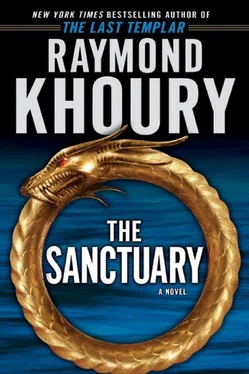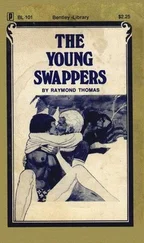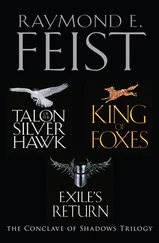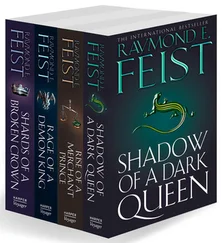“Mom?” she called out. “Webster?” She couldn’t quite bring herself to think of him as Dad yet, but she knew it would come.
They turned and saw her and waved her over, beaming. She rushed down the meadow and joined them. They were standing by a small pond. She embraced her mom and, hesitantly, gave Webster a soft hug, wary of his wound.
“When did you get here?” she asked, overjoyed.
“We rode up this morning,” Evelyn informed her. “ Kaak Sulayman”—she pointed out the mokhtar—“very kindly sent someone back to his village to bring us over.”
Mia remembered his riding away with his injured son. “How’s your son?” she asked him softly, hoping for the best.
“He will live,” the mokhtar said, a gleam of relief breaking through his dark eyes. “He will live,” he repeated, as if his mantra would help seal the deal.
Mia nodded. The harsh memories of the night before strafed her heart. As if sensing it, her father turned her attention to the elderly couple with them.
“These are Muneer and Arîya,” he said. “Your hosts.” His movements were slow and tentative, and he winced as he brought down his arm. Evelyn took his hand and held it in hers, supportively.
The elderly couple smiled affably at Mia.
“Thanks for coming to get me last night,” Mia told them. They shrugged humbly. She noticed something slightly strained and uncomfortable in their demeanor and saw it reflected fleetingly in Webster and in her mom. She suddenly remembered what had brought them here in the first place and, feeling a surge of excitement, turned to Webster.
“Well?” she asked him. “Do they have it? Have you asked them?”
The whole valley seemed to resonate with promise as Webster glanced conspiringly at the couple, then looked knowingly at her before swinging his eyes over to the pond.
She followed his lead and a puzzled look crossed her face before it clicked. “Is that it?” she asked, pointing at the pond.
Webster smiled and nodded. “That’s it.”
The pond was unremarkable, a shallow freshwater pool of murky water. Low-lying clusters of thin, small-leafed plants grew all over it.
She bent down to get a closer look. “What is it?”
“It’s called Bacopa ,” Webster said. “ Bacopa monniera. It’s also known as the herb of grace, which kind of makes you wonder…” He left it at that.
“We call it jalneem ,” Muneer added in surprisingly well-spoken English as he reached down, plucked a stem of it and gave it to Mia.
Mia fingered its thick, glistening leaves and studied its small, white flower. Her heart contracted as a wild exhilaration galloped through her. “What about…” She hesitated, looking at them, the key question catching in her throat. She turned to Webster. “Was Sebastian right? Does it work on…everyone?”
Webster met her gaze, and with a sparkle of infinite gratification in his eyes, he calmly nodded.
* * *
They sat around the small kitchen table and dug heartily into a meal of cornmeal porridge, cheese, bread, and olives that Arîya quickly prepared. Mia worked hard to rip her concentration away from the swirling questions in her mind and will herself to eat, knowing her body needed it.
It wasn’t easy.
She was sitting at the threshold of a new world.
The mokhtar had told Muneer what Webster had said to the hakeem, at Sebastian’s grave. He’d related the way Webster and his partners had protected the secret. He’d told him that Webster was Sebastian’s grandson. Which put Muneer at ease, at least enough to explore Webster’s story himself.
“The cabal that had the underground meeting rooms in Al-Hillah,” Evelyn asked, “what do you know of them?”
“They were our ancestors,” Muneer replied. “That’s where it all started, in southern Iraq, towards the middle of the eleventh century.
“A little-known scientist-philosopher by the name of Abu Fares Al-Masboudi, who had studied under Ibn Sina — Avicenna — before moving to Kufa, was the one who first made the discovery. The marshes of southern Iraq were rich in Bacopa , and travelers from India had spoken of how the people there had been using it for centuries, but not in that preparation. Which inspired his curiosity.”
Webster saw the question in Mia’s eyes. “It’s like the aspirin we talked about,” he told her. “If you chew on a piece of willow bark, it’s not going to have the same effect. It’s an elaborate chemical process, but it all starts with that plant.”
Muneer nodded. “Al-Masboudi started taking it himself and, thinking that it was merely a health tonic, gave it to his wife as well as to two colleagues of his and their wives. After years of taking the elixir, they all started noticing its effects. They realized its ramifications and formed the secret cabal you refer to in order to discuss what to do with it, whether or not to announce it. You have to remember, the world was a very different place back then. Everyone claimed to be after wondrous discoveries, but there was a thin line between experimenting on something and being labeled a sorcerer and hounded out, or worse.”
“We studied their writings,” Evelyn said, glancing at Webster. “Were they connected to the Brethren of Purity?”
“One of Al-Masboudi’s colleagues was with the brotherhood,” Muneer confirmed with an impressed nod. “They debated whether or not to let the Brethren in on their discovery, but ultimately decided to keep it to themselves, until they felt certain that it wouldn’t be abused by the rulers. Iraq, at the time, under the Caliph Al-Qa’im, was in almost as much turmoil as it is today. The Seljuks were posing a great challenge to the ruling Abbasid dynasties. My ancestors were worried that, if they gave the caliph the secret, they would be killed off, leaving him to bestow a long life on whomever he chose and turning him into a living god. And so they kept it quiet and waited, meeting in secret, modeling themselves on the Brethren, discussing and debating how a new world — one with longer-lived humans — could be made to work.
“As the years passed, people inevitably started talking. And my ancestors found they had to move on to new pastures and start new lives. They migrated north. Eventually, they settled in Yazidi territory”—acknowledging the mokhtar with a slight bob of his head—“and, ultimately, here, in this remote valley.”
“And the longer they waited, the more difficult it became to find a way to announce it,” Webster noted, more than asked.
Muneer nodded. “Up until recently, it was considered next to impossible to tell others about it. Our thinking has always been that either everyone should have access to it, or it should remain hidden. But for centuries, the whole planet was ruled by self-serving aristocracies and ruthless dictators. There was no fraternity among men, no true democracy. There was slavery. There were wars waged for vanity or greed. It was the few controlling the many. Not that the many were any better. It seemed as if man thrived on causing pain to others, on doing everything possible to rise above others at their expense and regardless of the pain and suffering he left behind. And we knew that something like this would only skew that equation and empower man’s darkest instincts. And so the question became, does man deserve to live longer, or would that only allow him to inflict more pain on his fellow man?”
“I don’t think you can paint everybody with the same brush,” Webster countered. “There are plenty of good people out there.”
“Possibly,” Muneer conceded. “You know it far better than we do. But you can understand our reticence. Greed and selfishness do seem to be central motivators of mankind.”
Читать дальше












